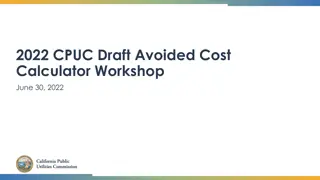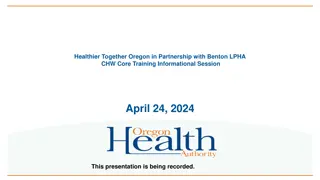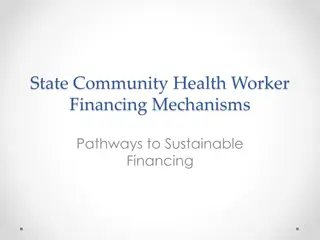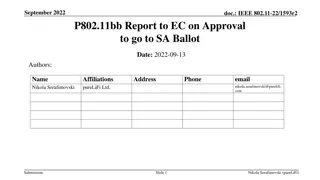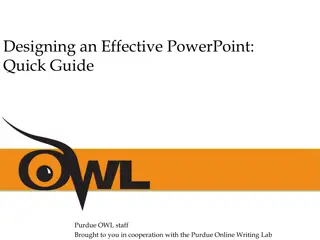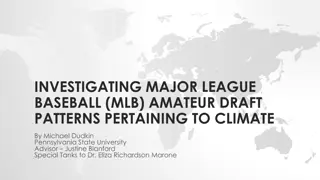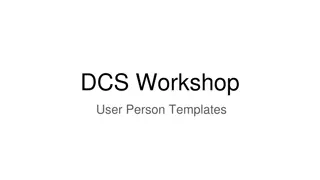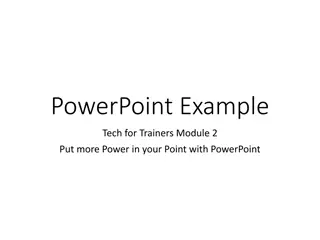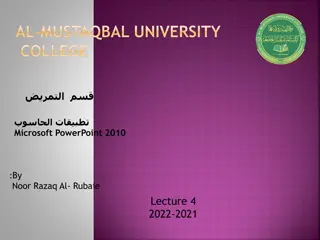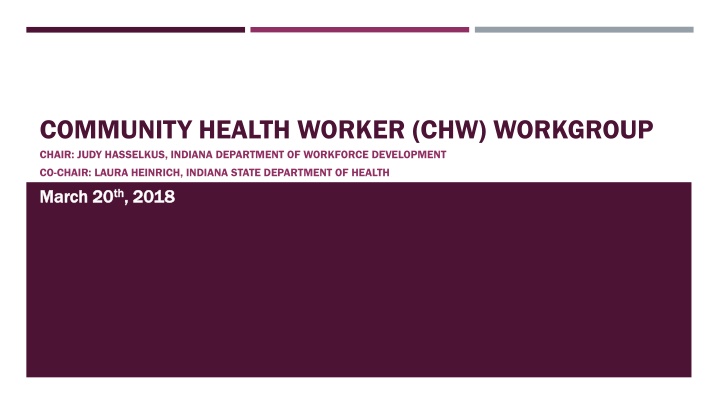
Community Health Worker Competencies and Skills Review
Explore the competencies and skills required for Community Health Workers, including communication, interpersonal, relationship building, and service coordination skills. Get insights from the workgroup chaired by Judy Hasselkus and co-chaired by Laura Heinrich in Indiana on March 20, 2018.
Download Presentation

Please find below an Image/Link to download the presentation.
The content on the website is provided AS IS for your information and personal use only. It may not be sold, licensed, or shared on other websites without obtaining consent from the author. If you encounter any issues during the download, it is possible that the publisher has removed the file from their server.
You are allowed to download the files provided on this website for personal or commercial use, subject to the condition that they are used lawfully. All files are the property of their respective owners.
The content on the website is provided AS IS for your information and personal use only. It may not be sold, licensed, or shared on other websites without obtaining consent from the author.
E N D
Presentation Transcript
COMMUNITY HEALTH WORKER (CHW) WORKGROUP CHAIR: JUDY HASSELKUS, INDIANA DEPARTMENT OF WORKFORCE DEVELOPMENT CO-CHAIR: LAURA HEINRICH, INDIANA STATE DEPARTMENT OF HEALTH March 20 March 20th th, 2018 , 2018
APPROVAL OF PREVIOUS MEETING MINUTES AND ROLL CALL
VOTING: COURSE OF ACTION FOR WORKGROUP* JUDY HASSELKUS, CHAIR LAURA HEINRICH, CO-CHAIR
REVIEW AND VOTING: CHW COMPETENCIES AND SKILLS* JUDY HASSELKUS, CHAIR LAURA HEINRICH, CO-CHAIR
1ST COMPETENCY: COMMUNICATION SKILLS a) Ability to use language confidently b) Ability to use language in ways that engage and motivate c) Ability to communicate using plain and clear language d) Ability to communicate with empathy e) Ability to listen actively Ability to prepare written communication (examples: client encounter documentation) including electronic communication (e.g., email, telecommunication device for the deaf) f) g) Ability to document work and communicate with care team (and employer) if applicable h) Ability to communicate with the community served (may not be fluent in language of all communities served)
2ND COMPETENCY: INTERPERSONAL AND RELATIONSHIP BUILDING SKILLS a) Ability to provide coaching, social support, and problem solving skills to the client b) Ability to conduct self-management coaching to empower individuals to improve their health c) Ability to use interviewing techniques (e.g. motivational interviewing) d) Ability to work as a team member e) Ability to manage conflict Ability to practice cultural humility and be sensitive to other cultures f)
3RD COMPETENCY: SERVICE COORDINATION AND NAVIGATION SKILLS a) Ability to coordinate care (including identifying and accessing resources, overcoming barriers, and understanding the social services and medical system) b) Ability to make appropriate referrals c) Ability to facilitate development of an individual and/or group action plan, goal attainment, and facilitate output of action plan d) Ability to coordinate CHW activities with clinical and other community services e) Ability to follow-up and track care and referral outcomes
4TH COMPETENCY: CAPACITY BUILDING SKILLS a) Ability to help others identify goals and develop to their fullest potential b) Ability to work in ways that increase individual and community empowerment c) Ability to network and build community connections d) Ability to teach self-advocacy skills e) Ability to assist with community organizing
5TH COMPETENCY: ADVOCACY SKILLS a) Ability to contribute to development of policies that focus on community health b) Ability to advocate for change in policies that focus on community health c) Ability to identify barriers to care for individuals and community and speaking up to promote change
6TH COMPETENCY: EDUCATION AND FACILITATION SKILLS a) Ability to use empowering and learner-centered teaching strategies that are culturally appropriate b) Ability to use a range of appropriate and effective educational techniques that are culturally appropriate c) Ability to facilitate group discussions and decision-making using culturally appropriate strategies d) Ability to plan and conduct classes and presentations for a variety of groups e) Ability to seek out appropriate information and respond to questions about pertinent topics (in a culturally appropriate context) Ability to find and share requested information that is culturally appropriate f) g) Ability to collaborate with other educators in a culturally appropriate context h) Ability to collect and use culturally appropriate information from and with community members
7TH COMPETENCY: INDIVIDUAL AND COMMUNITY ASSESSMENT SKILLS a) Ability to participate in individual assessment through observation and active inquiry b) Ability to participate in community assessment through observation and active inquiry
8TH COMPETENCY: OUTREACH SKILLS a) Ability to identify need, recruit, and follow-up b) Ability to prepare and disseminate information c) Ability to identify existing resources, build a current resources inventory, and maintain a current resources inventory
9TH COMPETENCY: PROFESSIONAL SKILLS AND CONDUCT a) Ability to set goals and to develop and observe a work plan b) Ability to balance priorities and to manage time c) Ability to apply critical thinking techniques, problem solving, and identify which cases require follow up with a larger team d) Ability to use pertinent technology e) Ability to maximize personal safety while working in community and/or clinical settings Ability to observe and follow ethical and legal standards (e.g. CHW Code of Ethics, Americans with Disabilities Act [ADA], Health Insurance Portability and Accountability Act [HIPPA]) g) Ability to identify situations calling for mandatory reporting and carry out mandatory reporting requirements h) Ability to participate in professional development of peer CHWs and in networking among CHW groups Ability to set boundaries and practice self-care f) i)
10TH COMPETENCY: EVALUATION AND RESEARCH SKILLS a) Ability to support evaluation and research processes including: i) assisting with collecting data ii) sharing results and findings
11TH COMPETENCY: KNOWLEDGE BASE a) Knowledge about social determinants or social factors related to health and health disparities b) Knowledge about pertinent health issues c) Knowledge about healthy lifestyles and self-care d) Knowledge about mental/behavioral health issues and their connection to physical health as well as the ability to recognize baseline issues or problems e) Knowledge about the factors that contribute to health behaviors Knowledge of basic public health principles f) g) Knowledge about the community served h) Knowledge about system and resources for health and social service in the United States and local community
UPDATE ON FSSA CHW INITIATIVES OFFICE OF MEDICAID POLICY AND PLANNING
KEY COMPONENTS OF A REGULATORY STRUCTURE 1. 1. Level of Occupational Regulation Level of Occupational Regulation License, State Certification, Registry 2. 2. Training Regulation Training Regulation What entity regulates training? What entity delivers training? Training logistics (hours, CE) 3. 3. Scope of Practice/Services Provided Scope of Practice/Services Provided Whether or not this is defined in statute
LEVELS OF OCCUPATIONAL REGULATION Registration: Registration: Involves nothing more than requiring an individual to inform the state that he/she is engaging in practice. When registration is imposed, it is mandatory that an individual be on the registry if he/she engages in a mandatory that an individual be on the registry if he/she engages in a practice practice. When registration is imposed, it is State State Certification: Certification: However, state certification differs from third-party certification in two major respects. First, the certifying body is the government rather than a private group. And second, state certification restricts the use of an occupational title though not, as licensing does, the practice of an occupation. Under state certification, anyone can work in an occupation, Under state certification, anyone can work in an occupation, but only those who meet the state s criteria can use a designated but only those who meet the state s criteria can use a designated title title. 1 Licensure Licensure: : Most restrictive form of state regulation Requires a scope of practice. Only a licensed member of the profession may practice the profession. Information synthesized from 1. http://ij.org/wp-content/uploads/2017/11/Inverted-Pyramid_FINAL.pdf and http://dhhs.ne.gov/publichealth/licensure/documents/LevelsOfStateRegulation.pdf
Level of Occupational Regulation Registration State Certification Licensure Registration implies that it is mandatory to be on a registry to engage in a practice, but does not have prerequisite requirements to be on the registry State certification is the stamp of approval given by state to an individual for meeting pre- determined requirements (key components: 1. certification is always voluntary and 2. anyone may practice as the occupation but the title of certified ___ is protected) Only those individuals who have met specific requirements to enter a profession are issued a license to practice the profession or to perform certain controlled acts ; there is also title protection as a licensed___ Definition Prerequisites for Labor Market Must be on registry in order to practice, but otherwise none Requirements determined by the state Requirements determined by the state Entry Information that is Maintained Minimal (name, that they are practicing in the state) Determined by the state Determined by the state Registration required to practice Certified individuals have protected title. However, individuals can deliver same services with or without the certification. Licensure required to practice. Licensed individuals also have title protection. Impact on this Workforce Sources: synthesized from the following documents: http://ij.org/wp-content/uploads/2017/11/Inverted-Pyramid_FINAL.pdf; https://www.hrpa.ca/Documents/Regulation/Series-on- Governance/What-it-means-to-be-a-regulated-profession-20160101.pdf; http://dhhs.ne.gov/publichealth/licensure/documents/LevelsOfStateRegulation.pdf
CHW REGULATION CASE STUDY: MINNESOTA Variable Variable State Certification In order for Medicaid-eligible CHW employers to receive Medical Assistance reimbursement for authorized CHW services, the CHW must hold a CHW certificate from one of the above mentioned schools that offer the standardized curriculum (exceptions were made for legacy provisions/ grandfathering ) Level of Regulation An individual is not required to have a certificate in order to practice as a CHW Training Regulator: the State DoH Training Regulation The State created a standard statewide CHW curriculum that is implemented in post- secondary schools Sources: Minnesota Department of Health Website: http://www.health.state.mn.us /divs/orhpc/workforce/emergi ng/chw/index.html; http://www.health.state.mn.us /divs/orhpc/workforce/emergi ng/toolkit/chwreg2016c.pdf Not outlined in statute or rule Scope of Practice/Services Provided
CHW REGULATION CASE STUDY: MINNESOTA (CONT.) Minnesota Medicaid statute: Subd. 49.Community health worker Community health worker. ( . (link link) ) (a) Medical assistance covers the care coordination and patient education services provided by a community health worker if the community health worker has: (1) received a certificate from the Minnesota State Colleges and Universities System approved community health worker curriculum; or Legacy provision (2) at least five years of supervised experience with an enrolled physician, registered nurse, advanced practice registered nurse, mental health professional as defined in section 245.462, subdivision 18, clauses (1) to (6), and section 245.4871, subdivision 27, clauses (1) to (5), or dentist, or at least five years of supervised experience by a certified public health nurse operating under the direct authority of an enrolled unit of government. Community health workers eligible for payment under clause (2) must complete the certification program by January 1, 2010, to continue to be eligible for payment. (b) Community health workers must work under the supervision of a medical assistance enrolled physician, registered nurse, advanced practice registered nurse, mental health professional as defined in section 245.462, subdivision 18, clauses (1) to (6), and section 245.4871, subdivision 27, clauses (1) to (5), or dentist, or work under the supervision of a certified public health nurse operating under the direct authority of an enrolled unit of government. (c) Care coordination and patient education services covered under this subdivision include, but are not limited to, services relating to oral health and dental care. Note: there is no reference to who/where a registry of certified CHWs is maintained. This is likely available through their equivalent to Commission for Higher Education. However their Medicaid office requires each certified CHW to register as a provider if they want to provide Medicaid eligible services, so a registry may also be pulled from their Medicaid office.
CHW REGULATION CASE STUDY: MINNESOTA SUMMARY CHW training is developed by the state (DoH), delivered at post-secondary institutions. The certificate is a state-developed and approved academic/technical certificate that is used by the State Medicaid office to determine whether a CHW is eligible to be a reimbursable provider. There is no formal registry. However, the Medicaid office has a list of individuals who have sought to become eligible providers. There are no continuing education requirements. The only requirements to become an eligible CHW provider are to have 1) completed the state certificate and 2) be employed under an eligible supervisor.
CHW REGULATION CASE STUDY: OREGON Variable Variable State Certification Oregon Health Authority (similar in function to FSSA + ISDH) certifies Medicaid Certified Traditional Health Workers (THW) An individual is not required to have a certificate in order to practice as a THW A criminal background check is required to become a certified THW. The state maintains a registry of certified THWs. Level of Regulation Training Regulator: the State (Commission appointed by the State) Oregon Health Authority Director appointed a 19-member Traditional Health Worker Commission Role: advise the state agency on development, implementation, sustainability The Commission approves training programs (there is no standard, state-developed curriculum) Training Regulation Sources (Oregon state agency websites) http://www.oregon.gov/oha/ oei/Pages/Traditional- Health-Worker- Program.aspx; https://secure.sos.state.or.u s/oard/displayDivisionRules. action?selectedDivision=17 41 Standardsof Professional Conduct are outlined in statute Scope of Practice/Services Provided
CHW REGULATION CASE STUDY: OREGON (CONT.) THW concepts outlined in statute: Definition Certification requirements (training, registry, background check) Continuing education requirements Standards of professional conduct Training program requirements (including: demonstrate use of different training delivery methods, maintain lists of individuals who completed training and those who applied for certificate, maintain record of attendance and participation, maintain lists of instructors) THW Curriculum Standards (including: core competencies, hour requirements, specialty-specific competency requirements) THW and Training Program Complaints/Investigation Source: https://secure.sos.state.or.us/oard/displayDivisionRules.action?selectedDivision=1741
CHW REGULATION CASE STUDY: OREGON SUMMARY Oregon has state-determined competencies but no standard curriculum. Each training provider must apply to the state, have curriculum reviewed/scored, and receive approval to be a state-certified training vendor. Registry maintained by state; including administering certificates, performing background checks, ensuring continuing education requirements are met. In order to obtain a state certificate, THW must: Be 18 years or older Complete a state-approved training program Pass background check Once all these requirements are met, the THW is certified and is added to the state-maintained registry.
NEXT STEPS JUDY HASSELKUS, CHAIR LAURA HEINRICH, CO-CHAIR
CLOSING AND ADJOURNMENT JUDY HASSELKUS, CHAIR LAURA HEINRICH, CO-CHAIR
NEXT MEETING DETAILS Thursday, April 19 Thursday, April 19th th 1:00pm- -2:30pm 2:30pm Indiana Government Center South, Conference Rooms 1+2 1:00pm Indiana Government Center South, Conference Rooms 1+2

